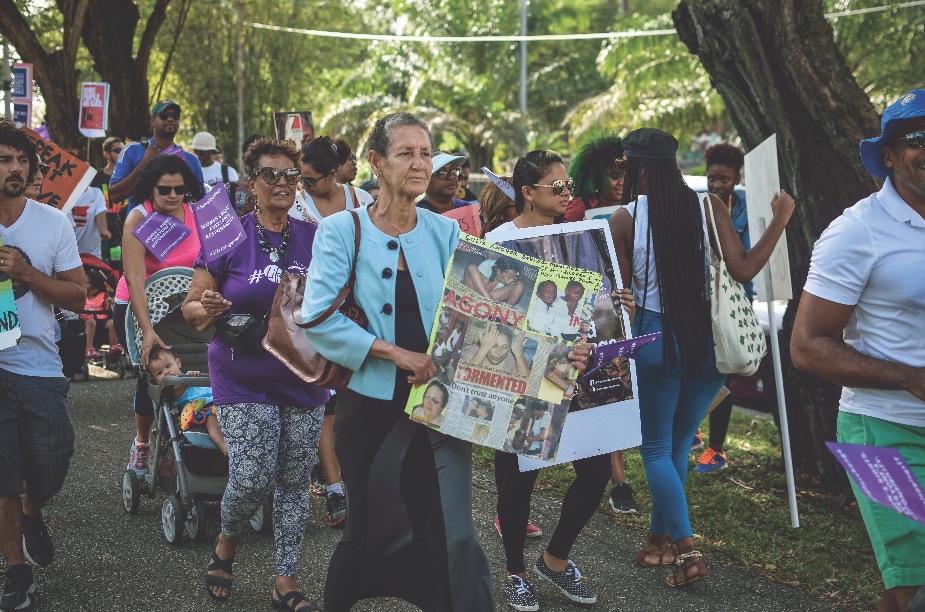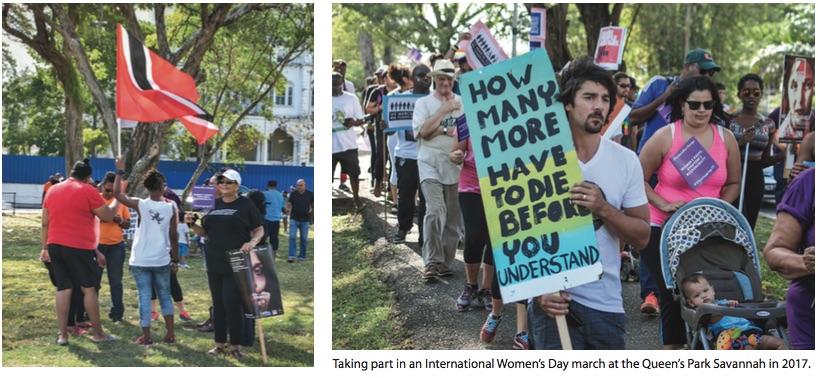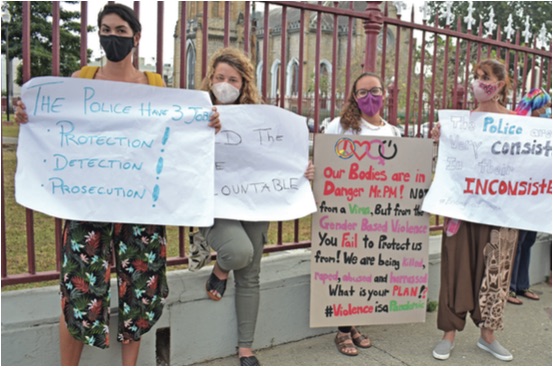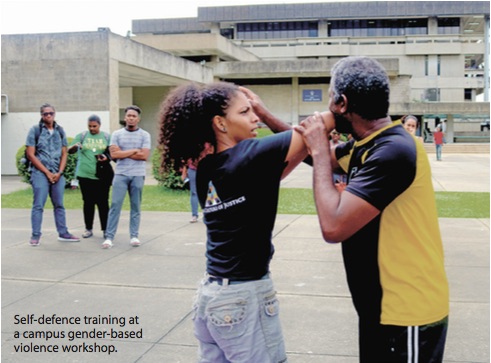Behavioural Sciences scholars delve into causes and solutions for the dangers women face

The violent deaths of Andrea Bharatt and Ashanti Riley within recent months have brought about an upsurge of protests, mass vigils and an outcry from citizens of all ages across the country pleading to lawmakers for more to be done to protect our women and children. But these crimes are not new to the country, as the issue of violence against women has been plaguing the nation for years. The frightening increase in gender-based violence and specifically violence against females recently have reignited much needed conversations and call for action to finally protect our most vulnerable in society.
Making a difference, however, does not lie solely in the hands of lawmakers but in all institutions across the country, including education. At the University of the West Indies, through teaching, learning, research and community outreach, the work towards a safer society continues as the university’s mandate includes tackling social issues affecting the Caribbean. It is well known that the Institute for Gender and Development Studies (IGDS) has done extensive work and been heavily involved in strategising against gender-based violence. IGDS has had multiple campaigns addressing the issue and continues to engage in social and community-based activism.

Shining light on other departments, UWI Today reached out to several scholars to get their feedback on what’s being done at the St Augustine Campus to deal with the scourge of violence against women in the country.
Lecturer and Practicum Co-coordinator at the Social Work Unit in the Department of Behavioral Sciences, Faculty of Social Sciences, Dr Cheryl Ann Boodram said, “Our primary task of teaching and learning draws people together to start eliminating all forms of violence against women. That is promoted in our curriculum, so we can say in the Social Work curriculum for instance, domestic violence and violence against women are significant parts of what our students are exposed to.
“But it’s not only within the Social Work discipline that teaching, learning and promotion of a culture of respect takes place. It’s rooted in the courses offered in IGDS that are taken by students campus-wide, and the social activism by students teaching other students about healthy gender relations,” she added.
Activism against social issues can be seen in groups like UWE Speak where spoken word poetry is used to advocate for protecting women. Additionally, there are special projects executed by students in neighboring communities and vacation camps that focus on violence against women.
She said gender justice was one of the strong pillars [and core values] at UWI and the aim is to graduate students from different communities where gender-based violence and violence against women may occur, by educating them so they can then transfer those lessons and behaviours back into their communities and families.

Dr Boodram said research also gives an understanding of what’s happening within the communities and by understanding the sources of where the problem arise, social change can occur. As such, there are many ongoing research projects that focus on gender-based violence, intimate partner violence, domestic violence and violence against women.
Sociologist and Head of the Department of Behavioral Sciences Dr Talia Esnard said one such initiative is called the Mentoring and Research Cluster (MARC) project. She explained that MARC is centred on building positive spaces for the mutual engagement of both staff and students. It seeks to foster a culture of mentorship through research, offering a collaborative space for exploring diverse perspectives and insights within the examination of social phenomena. Focusing on intimate partner violence, which many researchers observe as where most of the violence against women occurs, the project aims to gather multiple sources then use it to revisit, reframe and re-educate people.
Speaking of other projects within the campus, Dr Esnard said, “We have a number of PhD and Master’s students doing research and trying to address those issues. One student, for example, is looking at breaking the silence around domestic violence. And one of the things she tries to do, and is part of a broader agenda for other researchers in the Department doing this kind of work as well, is to broaden persons’ understanding of violence.”
“Not just at the level of gender, but also at the level of the household and to look at the broader issue of domestic violence as it occurs across different individuals, not just across partners but also across siblings, across mothers and fathers, or children and parents, children and children, and to raise awareness of the wider scope of the issue, of the various levels at which violence occurs in the society, and to really trouble the silence and taken-for-granted notions for violence that takes place in society,” she added.
Also part of the MARC project, Psychology lecturer, Dr Christine Descartes spoke of discussions within her classroom where she and her students tried to understand why and how people become perpetrators. She said conversations like these are examples of how through the curriculum, the issues of violence against women are addressed.
Research and conversations like these lead to finding both solutions and causes of such issues.

So what are some of the solutions?
Dr Descartes said socialising and re-socialising of our males needs to take place; teaching males how to deal with rejection; teaching both boys and girls how to interact, understand each other, and resolve conflict. There needs to be collaborative efficacy for change to occur. She said the protection of our girls and women needs to become everyone’s business. Additionally, Dr Boodram believes that engaging with civil society is another solution that can bring an end to violence against women. Dr Boodram said, “We need to have an all of society approach where all of the government ministries, NGOs and all of the interested community-based organisations, including religious organisations, come together to look at this social issue as a public health issue… where each organisation includes mainstream programming about gender-based violence as part of the normal work that they do. And the university can be an integral part of drawing all of those partners together.”
But the million-dollar question remains, why?
Why do people commit crimes against women in Trinidad and Tobago? What are the causes?
Dr Boodram said research showed that violence against women in the Caribbean is historically rooted in culture. She added that some of the narratives presented in our current music, videos and film suggest that individuals involved in these cultures have developed social norms where music promotes violence against women and unhealthy relationships, such as glorifying harsh and violent sexual intimacy.
Dr Descartes said, “A lot of our problems start in the home. It starts with how we treat our children and what we teach our children – the norms, the values – that all starts at home.”
Giving her perspective, Dr Esnard pointed out that “part of addressing the issue of violence in our society is dealing frontally with how we think about conflict and how we resolve it. In many cases, we see that people default to violence. Some of this remains embedded in how we are socialised. The question is, how do we shift the understanding of conflict and the behaviours that follow? This requires us to re-examine how we relate to each other, the sources and triggers of conflict, and how we work towards resolution and peacebuilding. There is certainly a lot to be done. What is clear is that this type of cultural and structural transformation calls for national and collective efforts.”
Those efforts are needed more than ever. In 2020, 47 women were killed—21 of them as a result of domestic violence -- representing around 13 percent of homicides that year. The Trinidad and Tobago Police Service (TTPS) also reported that of 745 people reported missing for 2020, 416 were women and girls.
How many more will disappear or die before there is change?